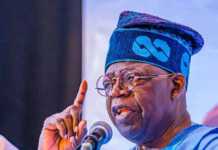 Radical Islamist sect suspects facing trial for involvement in deadly bombings, including a suicide attack on a U.N. headquarters, are junior members of the group, a government official said on Saturday.
Radical Islamist sect suspects facing trial for involvement in deadly bombings, including a suicide attack on a U.N. headquarters, are junior members of the group, a government official said on Saturday.
Four suspected members of Boko Haram, whose name means “Western education is forbidden”, face the death penalty if found guilty of carrying out the U.N. suicide car bombing last month that killed at least 23 people and wounded more than 100.
They were among 19 men brought to a magistrates court in Abuja on Friday accused of carrying out separate attacks as members of the sect, which is also blamed for almost daily killings around its home base in the remote northeast.
“Those being tried are not big guys but field operatives. The leaders are the ones who plan operations for the members to execute,” said Zanna Usman, spokesman for the governor of northeastern Borno state.
He said the opening of the trial cut both ways for the government. “It is good because the public can now see that no criminal is a sacred cow, especially where security to life is concerned. It is also bad because Boko Haram members may no longer consider the option of negotiation,” he added.
In July, President Goodluck Jonathan set up a committee to investigate unrest in the northeast and hold a dialogue with Boko Haram but its report has never surfaced, suggesting the government is taking a tougher approach after the U.N. blast.
The attack was the first known suicide bombing in Nigeria and marked an advancement in the group’s ambition and the sophistication of the explosives it uses.
Al Qaeda links
Intelligence officials have said evidence suggests some Boko Haram members have trained in Niger and have connections with al Qaeda’s North African wing.
The United States has become increasingly concerned about the threat posed by Boko Haram and its cooperation with al Qaeda.
The group’s menace has spread beyond its origins in the dusty northeast, where Africa’s most populous nation has borders with Cameroon, Niger and Chad. It took credit for a car bomb outside police headquarters in the capital in June that narrowly missed the chief of police and the U.N. strike.
“You Salisu Mohammed, Musa Mukailu, Danzumi Haruna and Abdusalami Adamu of Kano state conspired among yourselves and sent a suicide bomber in (Honda car) loaded with explosives who forcefully drove into United Nations House Abuja and detonated the explosives killing 25 persons,” prosecutors told the court.
The United Nations has confirmed 23 people dead and more than 100 wounded.
The defendants made no pleas because the court said the case was beyond its jurisdiction and ordered that it be sent to the Federal High Court for a hearing on November 3.
Another man was charged with his part in a New Year’s Eve bomb attack on an army barracks bar in Abuja, which killed at least four people.
The other defendants were accused of carrying out bomb attacks in the northern state of Bauchi or for possessing firearms, explosives and conspiring in terrorism.
Nigeria’s population of more than 140 million is split roughly equally between a largely Muslim north and a mostly Christian south.
Boko Haram, which wants Islamic sharia law more widely applied across Africa’s most populous nation, does not have the support of the majority of Nigerian Muslims.
Source: REUTERS




